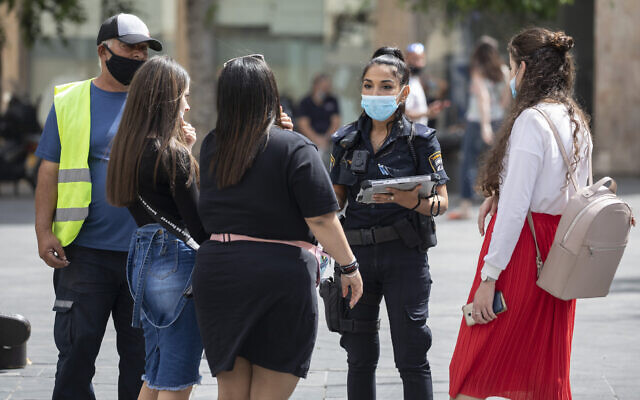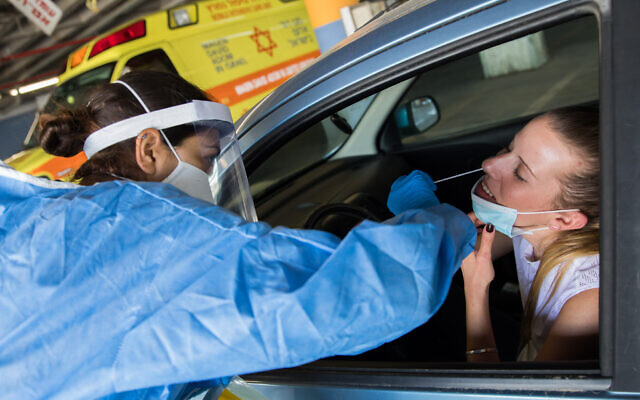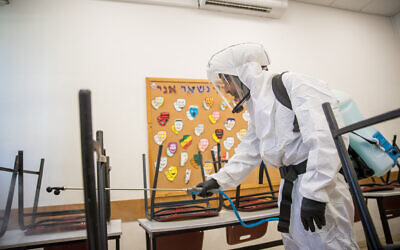Netanyahu warns restrictions could be reimposed if ‘steep rise’ in infection rate continues; health minister says ‘no one has an exemption’ from social distancing rules

Israel on Thursday recorded over 200 new coronavirus infections in a day for the first time since late April, before it began easing restrictions, as Prime Minister Benjamin Netanyahu warned that sweeping measures meant to contain the virus could be reimposed if the recent spike in fresh cases continues.
In a press conference at his office in Jerusalem, Netanyahu said the government’s focus was limiting the spread of the virus while allowing economic activity.
Though there are numerous signs that the economy was picking up again, “the problem still isn’t solved,” according to Netanyahu. “The good news is that the Israeli economy is recovering.”
Turning to the rise in COVID-19 cases, Netanyahu said the current pace of new infections was similar to that at the start of the pandemic.
“We’re in a place where the steep rise began that brought us the risk of seriously sick patients and people dying,” he said. “We must stop this increase on time.”
“If this continues, we’ll have to bring back the restrictions,” Netanyahu added, without elaborating.
He repeated his call for Israelis to wear masks, maintain distance from another and wash their hands. “The virus only respects those who respect the rules,” he said.
Netanyahu was asked later during the press conference why the public should obey the rules if he and other officials have not always adhered to them.
“Even though there are mishaps here and there, you don’t need to use them as a reason not to follow [the rules],” he said.

Speaking after Netanyahu, Health Minister Yuli Edelstein said that though there was a “continuous rise in infection,” he was not in favor of ordering fresh closures of businesses.
While he backed further reopenings, Edelstein said they would have to wait unless Israel improves its testing system and the public adheres to social distancing guidelines.
“The first matter is on me, under the responsibility of the Health Ministry,” he said.
Edelstein said the rise in the number of tests to some 16,000 a day created a “traffic jam” at medical laboratories processing the tests, but vowed to work toward “significantly shortening” the time it takes to inform people of their results.
He also stressed that “no one has an exemption from the guidelines,” seemingly alluding to a report that the deputy director-general of the Health Ministry had exempted a billionaire from having to self-quarantine upon arriving in the country.

Shortly after the press conference, the Health Ministry reported 214 new infections over the past 24 hours, continuing the trend of rising cases.
It was the first time over 200 new cases were reported in a day since April 26, before Israel began easing its lockdown.
The number of active cases passed 3,000, with the total number of recorded infections since the start of the pandemic rising to 18,569.
Of those sick, 34 were in serious condition, including 24 on ventilators. Another 39 people were in moderate condition and the rest had mild symptoms.
There were no new fatalities, with the death toll remaining at 300.
The ministry said 17,212 tests were conducted Wednesday.
Health officials have attributed much of the recent rise in new cases to schools, which reopened in May after a two-month closure.
According to the Education Ministry, 460 students and teachers have tested positive for the virus, with another 25,517 in quarantine.

It said 165 schools have been closed due to infections.
On Tuesday, Netanyahu ordered stepped-up enforcement of social distancing rules, including giving city officials the power to join police in enforcing mask-wearing and rules against large gatherings.
A day earlier, the government decided to freeze plans for a further easing of restrictions that would have allowed trains, cinemas and arts venues to open.
Amid the jump in cases, police were stepping up enforcement against Israelis failing to wear masks in public, handing out hundreds of fines on Wednesday. The number of mask fines distributed on Wednesday, 381, was four times higher than on any day last week, according to Channel 12. The fine for not wearing a mask in public is NIS 200 ($60).
Police have also fined more businesses that failed to heed the emergency rules. Fines for businesses range from NIS 2,000 to NIS 5,000 ($580-$1,450).
As reported by The Times of Israel
